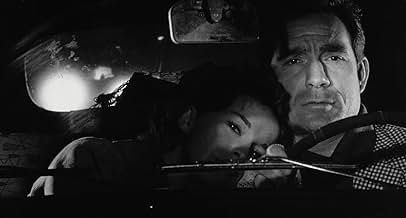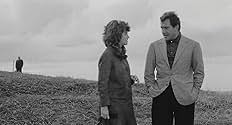Four short films by four different directors dealing with the principles of modern life.Four short films by four different directors dealing with the principles of modern life.Four short films by four different directors dealing with the principles of modern life.
- Awards
- 1 win total
- Husband (segment "Il nuovo mondo")
- (as Jean Marc Bory)
- The son (segment "Il pollo ruspante")
- (as Riky Tognazzi)
Featured reviews
"Illibatezza" by Roberto Rossellini. The story of an Alitalia hostess victim of what today we'd call a "stalker" who suffers from Oedipus complex. A simple, linear tale, although not immediately clear in its goal, in which the true star is the gorgeous Rosanna Schiaffino. In the American I can't help but see Rossellini's own sexual desire, probably participating in the act through his alter ego. Unfortunately Bruce Balaman (whose career counts only a couple of films) is not as captivating as the female lead, and the use of dubbing on the speaking actor makes things worse for him. It's interesting to note that Anna Maria admits to being obsessed with filming and taking pics of everything she experiences in everyday life, just like today's social networks invite us to do. This is a decisive cut from the author's Catholic phase and a change for the better, without ideological powers pressing on him. 8
"Il Nuovo Mondo" by Jean-Luc Godard. Godard never misses the chance to create something extremely unusual and destabilizing for the viewer, who is challenged to appreciate a language never before used in cinema. The short is about a possible future where an atomic bomb has been dropped near Paris and the psychological outcome this event has over the Parisiennes. The whole story is narrated in first person by the protagonist in voice over, which gives the feeling of reading a diary or a novel, except for a short dialogue between him and his lover (or, rather, "ex-lover"), whom appears to feel nothing anymore. Actually, the whole city "has changed", meaning that the fear of atomic destruction makes everyone's lives numb, with the help of some mysterious pill everybody seems to be taking. What Godard is showing us is the exact opposite of what we'd think a nuclear war would look like: apart from the screams and death of those directly hit by the bombs, everyone else would lose their interest in life, dragging a nihilistic existence, just like Alexandra does. Godard's signature features (jump cuts vs long takes) are there more than ever, with a beautiful fight between melancholy (underlined by the classical music) and raw truth (the fast cuts in the city). 8
"La ricotta" by Pier Paolo Pasolini. This is the most significant and historically important of the four films, so much that many consider this part more cinematically relevant than the whole container Ro.Go.Pa.G. Pasolini was sentenced to four months of reclusion for "contempt of the State religion", and the version we have public access to is a lot different than the original. It is a story about Stracci, a poor man working in the outskirts of Rome as an extra in a colossal about the Passion of Christ. Pasolini's message is very clear: we care more about the passion of the supposed son of God than of his sons'. Thus, while Stracci finally gets his desired meal, the saints in the movie laugh at him and cause his end. On the other hand, the characters of the director (Orson Welles!) and the journalist give out Pasolini's view of society, with the middle man being a "monstruosity" who doesn't understand deep thoughts but only his stupid, futile desires (like the dog). The film manages to be funny and extremely tragic at the same time, and the dycotomy between black-and-white actual world and colored fiction (and also between twist and classical music) explain through sensory experience the gap between reality and what show business wants us to believe. 9
"Il pollo ruspante" by Ugo Gregoretti. Of the four, "Il pollo ruspante" is the least interesting short. It is a critique of post-war Italian society, after the economic boom that made the nation and its inhabitants much richer and caused the birth of a larger middle-class. The events are narrated through a commerce professor who speaks using a laryngophone (which somewhat dehumanizes him) and lived by a family of four led by the greatly funny Ugo Tognazzi. Although it has some smart moments, the message underlying lies too much on the surface, making it so explicit that becomes bothering, especially when the customers at the restaurant literally become battery-bred chicken. While the other directors managed to make their films secretly full of meaning, Gregoretti tries way too hard to make everyone in the audience understand everything. Still, Tognazzi is always a delight to watch, and the situations are too surreal to plainly hate them. 7
Overall rating: 8
The Alitalia flight attendant Ana Maria (Rosanna Schiaffino) is harassed by the middle-aged American executive Joe (Bruce Balaban). A psychiatrist gives an orientation to her fiancé Carlo (Carlo Zappavigna), advising Ana Maria to behave like a slut, since the maniac is attracted by her chastity.
This first segment of "Ro.Go.Pa.G." is very disappointing, especially because of the name of Roberto Rossellini in the direction. This boring tale of obsession is neither funny nor dramatic, and seems to be only an advertisement of Italian air flight company Alitalia. My vote is four.
2) "Il Nuovo Mondo" ("O Novo Mundo" "The New World") Director: Jean-Luc Godard - A Dated Romance
The boy-friend of the gorgeous Alessandra (Alexandra Stewart) is hardly sleeping, so obsessed he is for her. When she confesses that she is also in love with him, he sleeps for two consecutive days. When he wakes-up, he reads in the newspaper that there was an atomic super-explosion over Paris, but the specialists advise that without any effect in the population. However, Alessandra changes her behavior, ex-loving him, and he feels that a new world without logic and freedom may be arising.
This second segment of "Ro.Go.Pa.G." is also very disappointing and absolutely dated in the theme and behavior, with every character smoking cigarettes all the time. It is a clear criticism to the menace of an atomic explosion in times of Cold War, and the absolutism of a world without freedom. The narrative in off makes the viewer expect some intriguing conclusion, but in the end it is completely failed and boring. My vote is four.
3) "La ricotta" ("A Ricota") Director: Pier Paolo Pasolini - An Acid View of the Catholicism and the Dominant Classes
While shooting "The Passion of Christ" in the periphery of Rome, the arrogant director (Orson Welles), actors, actresses and cast show their lack compassion with the poor and famine Stracci (Mario Cipriani).
This segment is a very acid view of the Catholicism, and a criticism to the bourgeoisie and the behavior of the human beings in general. The character of Stracci symbolizes the poor people in the world, and how despised they are by the hypocrite dominant classes and the Catholic Church that prays for them. The use of black and white to represent the reality, and colors the fiction of the cinema world is also great. My vote is seven.
4) "Il Pollo Ruspante" ("Frango Caseiro" "Home Cockerel") Director: Ugo Gregoretti - Powerful Criticism to Consumerism and Capitalism
While traveling to see a field nearby a lake, a family does not resist to the appeal of the consumerism. Meanwhile, a famous professor presents to the dominant classes, procedures to increase the consumerism of ordinary people.
This segment is a very explicit criticism to the exaggerated consumerism in the society. The scene when Togni (Ugo Tognazzi) and his middle class family goes to the restaurant is memorable. My vote is seven.
My global vote is six.
Title (Brazil): "Ro.Go.Pa.G."
This is a movie about making a movie. Pasolini's film-within-a-film is about the death of Jesus. Orson Welles portrays the director of this movie. I read that we're supposed to understand that his career has declined to the point where he can only make low-budget movies in Italy. (That's reasonable enough, although I don't understand how we would know that.)
In Welles' movie, we learn that, with the exception of a few stars, who play Mary and Mary Magdalene, the rest of the cast are supposed to be local people from the surrounding poor community. (Some of them may actually be those local people, but one of the angels is played by Ettore Garofolo, who co-starred with Anna Magnani in "Mama Rosa.")
Mario Cipriani stars as Stracci, the character who portrays the Good Thief. There is a running joke throughout the movie about Stracci somehow missing out on every meal. He ultimately steals a dog and sells it to make money. Then he buys an immense amount of cheese. (That's where the title of "La Ricotta" comes from.)
The movie switches back and forth between color for the movie-within-a-movie, and black and white for the movie itself.
The whole movie has a rough, slapped together quality about it. It's not a great film, although reviewers who have seen all four segments say it's the best one.
We saw this film on the smal screen, because it was a bonus DVD packaged with the Pasolini movie "Mama Rosa." Mama Rosa is worth seeing. If you buy it as part of the Criterion Collection, you will have "La Ricotta." Because it's short, and it's there, I would watch it. I don't think it's worth seeking out otherwise.
If IMDb is to be believed, not too many people have actually seen this film. And I have to wonder why, when it has three or four of the biggest names in Italian cinema, not to mention Orson Welles. This makes a great introduction to Italian film for those who need such an introduction. Others have compared it to "Four Rooms", which is an interesting parallel. Stylistically, the two have nothing in common, but it does have that interesting approach of four different directors creating one film...
Did you know
- TriviaOrson Welles' voice was dubbed into Italian by another actor.
- GoofsIn the segment "La ricotta," Orson Welles is directing a "re-enactment" of the Crucifixion. It shows Jesus lying on top of a cross, tied down, while 4 men carry Christ and his cross up a hill. According to the Stations of the Cross, Christ carried his own cross.
- Quotes
The Journalist (segment "La ricotta"): I hope I'm not disturbing. I'm a journalist. I'd like to get a little interview.
The 'Director' (segment "La ricotta"): No more than 4 questions.
The Journalist (segment "La ricotta"): Thank you. First, what do you mean to express with this new work?
The 'Director' (segment "La ricotta"): My intimate, profound archaic Catholicism.
The Journalist (segment "La ricotta"): Second, what do you think of Italian society?
The 'Director' (segment "La ricotta"): The most illiterate masses, and the most ignorant bourgeoisie in Europe.
The Journalist (segment "La ricotta"): And third, what do you think of death?
The 'Director' (segment "La ricotta"): As a Marxist, I never give it any thought.
The Journalist (segment "La ricotta"): Fourth and last question: What do you think of our great director Federico Fellini?
The 'Director' (segment "La ricotta"): He dances.
- Alternate versionsThe Portuguese subtitled version was shown with episodes in a different order: first Frango no Campo / "Pollo rumpante, Il"; then O Novo Mundo / "Nuovo mondo, Il"; and last "Pureza" / "Illibatezza". Pasolini's episode was totally cut by the scissors of official censorship in the theatrical release.
- SoundtracksRicotta Twist
by Carlo Rustichelli
- How long is Ro.Go.Pa.G.?Powered by Alexa
Details
- Runtime1 hour 51 minutes
- Color
- Sound mix
- Aspect ratio
- 1.85 : 1























